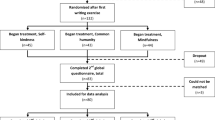Abstract
The present article will focus on the cognitive theory of mindfulness and its importance in achieving unconditional self-acceptance. The goal of the mindful perspective is to increase cognitive flexibility and to thereby increase behavioral flexibility and the ability to adapt to one’s current environment in a meaningful manner. Empirical evidence spanning four decades attests to the beneficial effects of a mindful vs. mindless perspective. The article will focus on the following aspects of mindfulness as they apply to self-acceptance: the importance of authenticity, the tyranny of evaluation, the benefits of mistakes, the mindlessness of social comparison, the trap of rigid categories, and the acceptance of self as a mindful choice. The article concludes with a number of mindfulness applications geared toward enhancing self-acceptance.
Similar content being viewed by others
References
Carson S., Langer E. (2004). Mindful practice for clinicians and patients. In: Haas L. (ed.), Handbook of primary care psychology. London, Oxford, 173–186
Chanowitz B., Langer E. (1981). Premature cognitive commitmentJournal of Personality and Social Psychology 41: 1051–1063
DePaulo B. M., Kashy D. A., Kirkendol S. E., Wyer M. M., Epstein J. A. (1996). Lying in everyday lifeJournal of Personality and Social Psychology 70: 979–995
Gutierres S. E., Kenrick D. T., Partch J. J. (1999). Beauty, dominance, and the mating game: Contrast effects in self-assessment reflect gender differences in mate selectionPersonality and Social Psychology Bulletin 25: 1126–1134
Ho, D. (1999). Alexander Fleming. Time Magazine, 153, 117–119. March 29, 1999
Hussain M. S., Langer E. (2003). A cost of pretendingJournal of Adult Development 10(3): 261–270
Isen A. M. (2000). Positive affect and decision making In: Lewis M., Haviland-Jones J. M. (eds). Handbook of emotions. 2nd edn. New York,Guilford Press
Kawakami C., White J. B., Langer E. J. (2000). Mindful and masculine: Freeing women leaders from the constraints of gender rolesJournal of Social Issues 56(1): 49–63
Langer E. (1989). Mindfulness Reading, MA, Addison-Wesley
Langer E. (1997). The power of mindful learning Reading, MA, Addison-Wesley
Langer E. (2005). On becoming an artist: Reinventing yourself through mindful creativity. New York, Ballantine Books
Langer E. J., Janis I., Wolfer J. (1975). Reduction of psychological stress in surgical patientsJournal of Experimental Social Psychology 11: 155–165
Langer E. J., Moldoveanu M. (2000). The construct of mindfulnessJournal of Social Issues 56(1): 1–9
Langer, E., & Pietrasz, L. (1995). From reference to preference. Unpublished manuscript: Harvard University
Langer, E., Steshenko, Y., & Cummings, B. (in preparation). Mistakes as a mindful cue
Lockwood P., Kunda Z. (1997). Superstars and me: Predicting the impact of role models on the selfJournal of Personality and Social Psychology 73: 91–103
Roth D. L., Snyder C. R., Pace L. M. (1986). Dimensions of favorable self- presentationJournal of Personality and Social Psychology 51: 867–874
Shapiro, A. (2003). Scared straight! DVD, New Video Group
White, J., Langer, E., Yuriv, L., & Welch, J. (in press). Frequent social comparisons and destructive emotions and behaviors: The dark side of social comparisons. Journal of Adult Development
Author information
Authors and Affiliations
Corresponding author
Rights and permissions
About this article
Cite this article
Carson, S.H., Langer, E.J. Mindfulness and self-acceptance. J Rat-Emo Cognitive-Behav Ther 24, 29–43 (2006). https://doi.org/10.1007/s10942-006-0022-5
Published:
Issue Date:
DOI: https://doi.org/10.1007/s10942-006-0022-5




